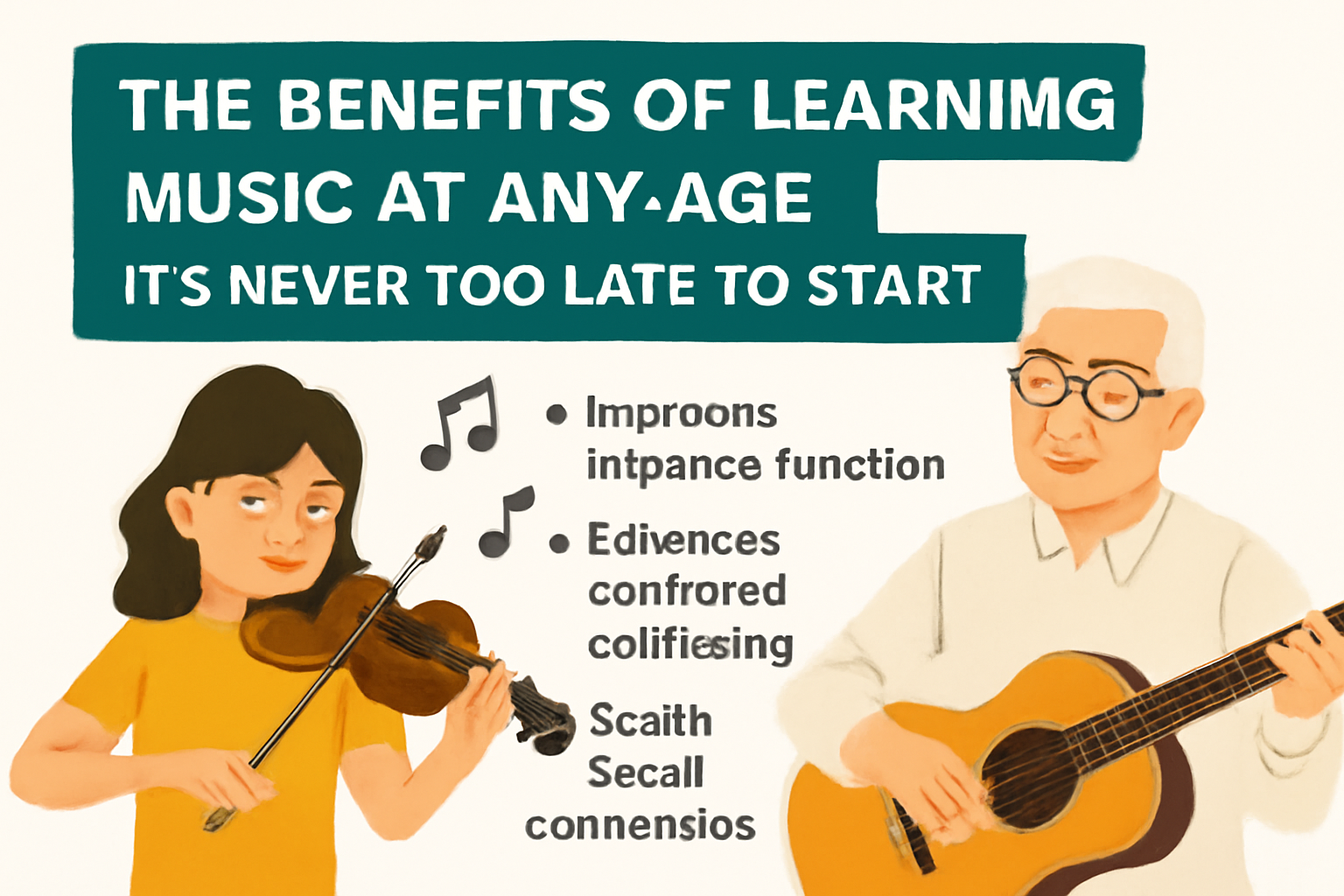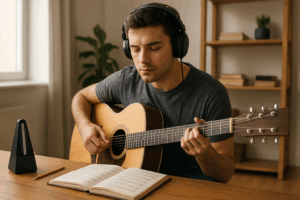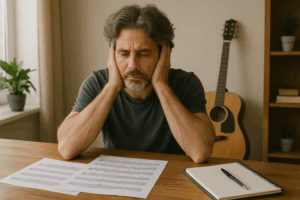When it comes to learning music, many people believe that it’s something best started in childhood. While it’s true that early exposure to music can be beneficial, the idea that it’s too late to start learning music as an adult is a common misconception. Whether you’re in your 20s, 40s, or even older, learning music can offer numerous benefits at any stage of life.
In this article, we’ll explore the many advantages of learning music as an adult and why it’s never too late to start playing an instrument, singing, or pursuing a musical hobby.
1. Boosting Cognitive Function
Learning music has been shown to have a positive impact on cognitive function, regardless of age. Music engages multiple areas of the brain, helping to improve memory, attention, problem-solving, and executive function. For adults, this is especially important, as it can help maintain cognitive health and slow down age-related decline.
How Music Enhances Brain Function:
- Memory Improvement: Learning to play an instrument or memorize lyrics can help strengthen both short-term and long-term memory.
- Better Attention and Focus: Playing music requires concentration and attention to detail, which can help improve focus in other areas of life.
- Improved Problem-Solving: Music challenges the brain to process patterns, rhythms, and harmonies, which can improve problem-solving skills.
By learning music as an adult, you engage your brain in a way that helps keep it sharp, active, and healthy.
2. Reducing Stress and Enhancing Mental Health
Playing an instrument or engaging in music-related activities can have a significant positive impact on mental health. Music is known for its ability to reduce stress, alleviate anxiety, and improve overall mood. For adults, learning music can be a fulfilling and therapeutic hobby that provides a healthy outlet for stress.
How Music Reduces Stress:
- Relaxation: Playing or listening to music can help lower blood pressure and heart rate, promoting relaxation.
- Emotional Expression: Music provides a way to express emotions, whether through songwriting, improvisation, or simply playing your favorite piece.
- Mindfulness: Focusing on playing an instrument can act as a form of mindfulness, where you are fully present in the moment, helping you disconnect from the stress of daily life.
Whether you’re playing the piano, guitar, or singing, music allows you to unwind and de-stress after a long day.
3. Enhancing Social Connections
Learning music as an adult can also enhance your social life. Music provides an opportunity to meet new people, join music groups, or participate in community events. Whether you’re taking lessons, attending a jam session, or performing in a group, music brings people together, creating social bonds and connections.
How Music Fosters Social Interaction:
- Group Lessons or Ensembles: Participating in group music lessons or joining a local band or choir is a great way to meet like-minded people and make new friends.
- Collaborative Learning: Playing music with others fosters teamwork and communication, both of which are important social skills.
- Community Events: Many communities host open mic nights, local concerts, or music festivals, giving you a chance to socialize while enjoying live music.
Music can help create meaningful social interactions and build lasting friendships.
4. Building Self-Confidence and Achievement
Learning music is an incredibly rewarding experience that offers a sense of accomplishment and boosts self-confidence. For adults, the journey of learning a new skill like playing an instrument can be especially empowering. It shows that no matter your age, you can still challenge yourself and achieve something new.
How Music Boosts Confidence:
- Mastering New Skills: Every time you learn a new song or improve a technique, you gain a sense of achievement and pride.
- Performing in Front of Others: Whether you’re playing for a small group of friends or performing at a concert, sharing your music with others builds confidence and self-assurance.
- Overcoming Challenges: Learning music is a process that comes with its challenges, but overcoming obstacles—whether it’s mastering a difficult chord or learning to read sheet music—improves your resilience and boosts self-esteem.
As you progress in learning music, you’ll see tangible evidence of your hard work, which will increase your confidence in other areas of life.
5. Stimulating Creativity and Problem-Solving Skills
Learning music encourages creativity and self-expression. When you play music, you interpret the notes and rhythms in your own way, making each performance unique. This creativity extends to other areas of life, helping you think outside the box and approach problems from different angles.
How Music Stimulates Creativity:
- Improvisation: If you’re playing an instrument like the piano or guitar, improvisation allows you to express your musical ideas freely, without the constraints of written music.
- Composing: Writing your own music encourages you to think creatively and develop original ideas.
- Artistic Expression: Music gives you a platform to communicate feelings and ideas that may be difficult to express in words.
By learning music, you unlock your creative potential and open yourself up to new ways of thinking.
6. Improving Coordination and Motor Skills
Playing an instrument requires hand-eye coordination, dexterity, and the ability to multitask. These skills are essential for musicians and can improve over time with practice. For adults, learning music is an excellent way to sharpen motor skills and keep your body in sync with your mind.
How Music Enhances Coordination:
- Finger Dexterity: Playing instruments like the piano, guitar, or violin requires precise finger movements, which can improve finger dexterity and fine motor skills.
- Multi-tasking: Many instruments require you to use both hands (and sometimes your feet, as with the piano or drums) simultaneously, helping to improve coordination and multitasking ability.
- Improved Reflexes: Regular practice can help increase your reflexes and reaction time, especially in rhythm-based instruments.
Music training helps develop physical coordination that benefits both musicians and non-musicians alike.
7. Lifelong Learning and Personal Growth
One of the most fulfilling aspects of learning music as an adult is the opportunity for lifelong learning and personal growth. Whether you’re just starting or revisiting a long-lost passion, music is something you can continue to explore and enjoy at any age. It’s a skill that doesn’t have an expiration date and can bring lifelong joy and fulfillment.
How Music Encourages Lifelong Learning:
- Continuous Improvement: Even after years of playing, there’s always something new to learn in music, whether it’s mastering a new technique or exploring a new genre.
- Personal Satisfaction: The pursuit of learning music provides ongoing personal satisfaction as you continue to achieve milestones and enjoy the process of self-improvement.
- Cross-Generational Connection: Music allows people of all ages to connect and share experiences, whether through family, friends, or community groups.
No matter when you start, music offers a never-ending path of discovery, learning, and growth.
Learning music as an adult is not only possible, but it can also be one of the most rewarding experiences of your life. Whether you’re looking to improve your cognitive function, reduce stress, build social connections, or simply enjoy the pleasure of playing an instrument, the benefits of learning music are vast and varied.
Remember, it’s never too late to start. With dedication, practice, and the right mindset, you can unlock a world of possibilities through music, no matter your age. Embrace the journey, and enjoy the many rewards that come with learning music at any stage in life.




